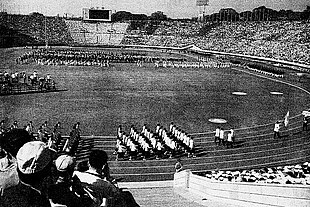
The 1958 Asian Games, officially known as the Third Asian Games (Japanese: 第3回アジア競技大会), was a multi-sport event held in Tokyo, Japan, from 24 May to 1 June 1958. A record total of 1,820 athletes representing 20 Asian National Olympic Committees (NOCs) participated in 13 sports divided into 97 events.[1] The tradition of the torch relay was introduced for the first time in the Asian Games,[2] and the Games cauldron was ignited by the first Japanese Olympic gold medallist and the first Asian Olympic champion in an individual event, Mikio Oda.[2][3]
Athletes from 16 nations earned medals at the Games, and athletes from 11 of these nations won at least one gold medal. Indian national record holder in 200– and 400 metres, Milkha Singh, won gold medals in both the events and set a new Asian Games record in 400 metres.[4][5] 1956 Melbourne Olympics silver medallist in 400– and 1500 metres freestyle events, Tsuyoshi Yamanaka, won gold medals in these two events.[6] The Japanese 4×100 metres medley relay team of Keiji Hase (backstroke), Masaru Furukawa (breaststroke), Manabu Koga (freestyle) and Takashi Ishimoto (butterfly) won the gold medal with a time of 4:17.2 and broke the world record.[7]
A total of 350 medals (112 gold, 112 silver and 126 bronze) were awarded. Only the Republic of China managed to improve its position in the medal table compared to the 1954 Asian Games. The host nation, Japan, topped the medal table for the third consecutive time in the history of the Games,[8] having collected almost 60% of the total gold medals; it also secured the most silver and bronze medals. Competitors from the host of the 1954 Games, the Philippines, won 48 medals (including eight gold) and helped their nation to be seated at the second place on overall medal tally. South Korean athletes improved their total medal count by eight from 1954, earning third spot on the table.
- ^ "Games History – Tokyo (Japan) 1958". New Straits Times. Kuala Lumpur. 5 December 1998. p. 34. Retrieved 1 January 2014.
- ^ a b "Asian Games – Tokyo 1958". Olympic Council of Asia. Archived from the original on 28 February 2018. Retrieved 1 January 2014.
- ^ Nakamura, Ken (26 April 2010). "Interview with Mikio Oda, first Japanese Olympic gold medallist". International Association of Athletics Federations. Retrieved 1 January 2014.
- ^ "Farhan's date with Milkha Singh". The Hindustan Times. New Delhi. 13 November 2011. Archived from the original on 10 June 2014. Retrieved 1 January 2014.
- ^ "Sprinting Past Our Challenges". Mail Today. New Delhi. 30 July 2013. Archived from the original on 10 June 2014. Retrieved 1 January 2014.
- ^ "Swimming – Past Medals". Doha-2006.com. Doha Asian Games Organising Committee. 26 November 2006. Archived from the original on 5 January 2007. Retrieved 2 January 2014.
- ^ "A worldwide roundup of the sports information of the week". Sports Illustrated. 8 (23). 9 June 1958. Archived from the original on 2 January 2013. Retrieved 3 January 2014.
- ^ "Events & Discoveries – Asian Games". Sports Illustrated. 8 (22). 2 June 1958. Archived from the original on 2 January 2014. Retrieved 3 January 2014.